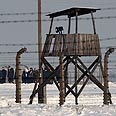
Denis Avey, 92, wrote "The Man who Broke into Auschwitz" about his time as a prisoner in a nearby labor camp in Nazi-occupied Poland.
The book, published by Hodder & Stoughton, generated significant media coverage. But a subsequent investigation by the Daily Mail quoted historians, Jewish groups and former Auschwitz inmates who said they had serious misgivings about some of its content.
The main point of contention was Avey's account of how he twice swapped places with a Dutch Jew in order to smuggle himself into Auschwitz III camp following weeks of planning including bribes to a guard.
Piotr Setkiewicz, head of research at the Auschwitz-Birkenau memorial and museum, told Reuters that while it was impossible to prove or disprove Avey's swap story due to the absence of survivors personally involved, it was a problematic account.
"Theoretically it is possible to do such a thing, but for practical reasons it would be extremely difficult," he said.
"It is a question of confirmation, and I can't see any way to confirm Mr. Avey's story. Nevertheless, privately, I don't think this (the swap) happened."
He said it was almost certain the swap would have been detected even if a guard was bought off and a handful of fellow prisoners kept informed.
Setkiewicz added that the "Arbeit Macht Frei" sign under which Avey said he marched almost certainly did not exist at Auschwitz III, although he did not have conclusive proof.
'It is a fact'
Hodder & Stoughton issued a point-by-point rebuttal of the Daily Mail article by Guy Walters, while Avey and co-author Rob Broomby stood by their story.
"I am certainly not distancing myself from the book at all," said Broomby. "I stand by everything in the book."
Broomby, a journalist, said he saw Avey shortly after the Mail article appeared and he made the following statement:
"I am disappointed and sorry that they have doubted my word. This sort of thing is deeply unpleasant ... I did what I did and that is it. In war everything you do is more extreme. I stand by my account. It is a fact."
Setkiewicz said he had nothing personal against Avey, but argued that it was important to scrutinise accounts of what happened in the concentration camps to avoid providing ammunition to Holocaust deniers.
"Perhaps 80 or 90% of what Mr. Avey says is true, but the problem is that deniers have this wonderful habit of fixing on every single thing which is obviously not true."
Nazi Germany killed six million Jews during the Holocaust and Auschwitz-Birkenau was the largest Nazi concentration and extermination camp.
Hodder & Stoughton said it was "proud to publish" Avey's book, adding: "We have never doubted Mr. Avey's testimony."
It confirmed that it received a fax from the World Jewish Congress asking to have the book verified, and that it responded to the questions and sent a copy of the book "so they can read the detailed explanation".
Yad Vashem, the Holocaust remembrance authority, said it was unable to honor Avey with the title "Righteous Among the Nations" because it was unable to substantiate his account of the prisoner swap.
A spokeswoman said the organization was not criticizing Avey's account, and Hodder argued that the lack of survivors from that time meant it was "not at all surprising" that the necessary corroboration could not be found.
- Follow Ynetnews on Facebook















